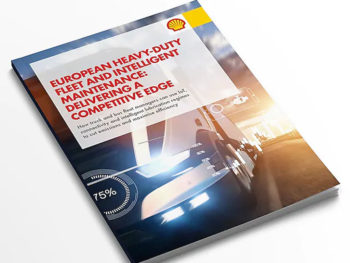Shell Lubricants has launched a new industry report to support commercial fleet managers with the transition from traditional fleet models to future mobility with emissions cuts and maximising efficiency.

The report has been made in response to legislative changes in the EU that push adoption of zero-emission vehicles by demanding the transport sector reduces emissions to 40% below those of 1990, and fleet managers face similar pressure to improve efficiency by 27%, by 2030, to align with transport industry targets.
Working closely with Roberto Paganuzzi, Shell’s european technical manager, the report offers an insight into how emerging technologies and premium lubricants can be integrated into existing fleet management budgets and practices, to allow for a more efficient and sustainable future.
When discussing the impact of new technologies on maintenance processes and effective modernisation, Roberto Paganuzzi said, “For the first time, you can highly personalise your maintenance regimes. With high-performance lubricants, fleet managers can customise the running environment for individual components, with huge benefits for running expenses.”
The report focuses on HGV operators, but the findings relate to those operating heavy vans too. It also marks the launch of Shell Driveline, a new holistic approach to fleet maintenance, a suite of high performing products and expert services.
Maintenance practices will play an important part in tomorrow’s fleet, with research finding that 93% of fleet managers recognise that new technologies will impact their choice of lubrication. Through pairing new maintenance regimes with modern fleet management technology, such as lubrication tracking consoles it was found that drivers could cut fuel expenses by up to 25% and increase productivity by 15%.

